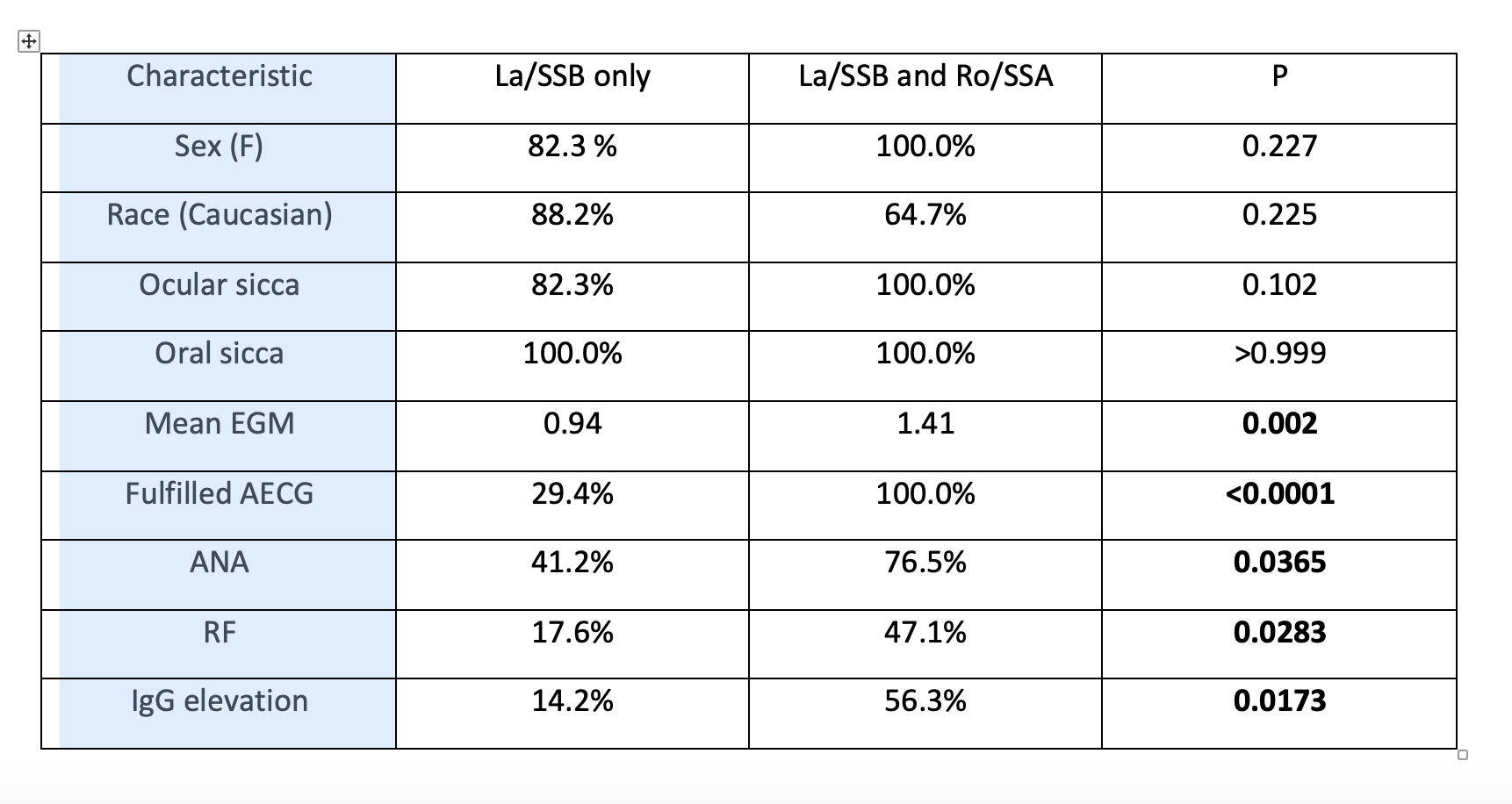Session Information
Date: Sunday, November 8, 2020
Title: Sjögren’s Syndrome Poster
Session Type: Poster Session C
Session Time: 9:00AM-11:00AM
Background/Purpose: Sjögren’s disease (SS) is characterized by the presence of antibodies against protein-small RNP complexes designated Ro/SSA and La/SSB. Both are included in the 2002 American-European Consensus Group Criteria (AECG) for SS, however La/SSB was excluded from the 2016 ACR-EULAR on the basis of findings1,2 demonstrating that SS patients seropositive for La/SSB without Ro/SSA (La/SSB) lacked an association with the phenotypic features of SS. We examined our single-center rheumatology division based primary SS cohort for the presence of patients SS displaying La/SSB. The phenotypic characteristics of this subset was compared to SS patients seropositive for La/SSB and Ro/SSA.
Methods: We retrospectively reviewed the charts of 318 patients for primary SS to determine the prevalence of La/SSB . Patients suspected of having secondary SS on the basis of the presence of another major connective tissue disorder were excluded. One hundred and twenty-eight fulfilled AECG. La/SSB were matched by age and symptom duration to an equal number of patients who were positive for La/SSB and Ro/SS-A. Groups were examined for sex, race, sicca symptoms, number of extraglandular manifestations (EGM), fulfillment of AECG, presence of ANA, RF, and IgG level at presentation. The difference between continuous variables was determined by the Wilcoxon ranked sign test. Differences in proportions among categorical variables was determined by Fisher’s exact test.
Results: Of the 318 evaluated charts, 17 had La/SSB without Ro/SSA (5.3%). When compared to 17 with La/SSB and Ro/SSA, differences in clinical and laboratory characteristics were noted. La/SS-B displayed significantly fewer EGM, fulfilled AECG less often, and had significantly lower levels of RF, ANA and serum IgG. La/SSB were more often Caucasian (NS) (see Table 1 for details). The 5 La/SSB who fulfilled AECG represented 3.9% of the 128 patients fulfilling AECG; all 5 had positive labial salivary gland biopsies.
Conclusion: Consistent with results from the SICCA cohort1 and the OMRF cohort2, a small percentage (3.9%) of our rheumatology division based SS cohort who fulfilled SS criteria had La/SSB in the absence of Ro/SSA. In the majority of cases, La/SSB appears to constitute an atypical form of SS or represent a related but distinct autoimmune disorder.
References; 1Baer A. et al. Ann. Rheum. Dis. 2015:74(8); 1557-1561 2 Danda D. et al. Clin. Exp. Rheumatol. 2017:35; 438-444
 Differences between Sjogren’s patients displaying La/SSB alone versus La/SSB with Ro/SSA
Differences between Sjogren’s patients displaying La/SSB alone versus La/SSB with Ro/SSA
To cite this abstract in AMA style:
Mongroo R, Chowdhury S, Carsons S. Patients Seropositive for La/SSB Without Ro/SSA Differ from Those Displaying La/SSB with Ro/SSA in a Single Center Sjogren’s Cohort [abstract]. Arthritis Rheumatol. 2020; 72 (suppl 10). https://acrabstracts.org/abstract/patients-seropositive-for-la-ssb-without-ro-ssa-differ-from-those-displaying-la-ssb-with-ro-ssa-in-a-single-center-sjogrens-cohort/. Accessed .« Back to ACR Convergence 2020
ACR Meeting Abstracts - https://acrabstracts.org/abstract/patients-seropositive-for-la-ssb-without-ro-ssa-differ-from-those-displaying-la-ssb-with-ro-ssa-in-a-single-center-sjogrens-cohort/
